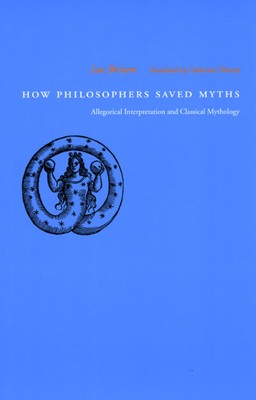
- We will send in 10–14 business days.
- Author: Luc Brisson
- Publisher: University of Chicago Press
- ISBN-10: 0226075370
- ISBN-13: 9780226075372
- Format: 15.4 x 22.6 x 1.4 cm, minkšti viršeliai
- Language: English
- SAVE -10% with code: EXTRA
Reviews
Description
In this concise but wide-ranging study, Luc Brisson describes how the myths of Greece and Rome were transmitted from antiquity to the Renaissance. He argues that philosophy was responsible for saving myth from historical annihilation. Although philosophy was initially critical of myth, mythology was progressively reincorporated into philosophy through allegory. Brisson reveals how philosophers employed allegory and how it enabled myth to take on a number of different interpretive systems throughout the centuries: moral, physical, psychological, political, and even metaphysical.
"This wonderful book confirms Brisson's status as one of the major authorities in the field of classical antiquity. Overall, and with this excellent translation, the book is invaluable."--Choice
"A compressed overview with moments of great insight. . . . Its strengths lie in the details Brisson is able to work into this brief treatment."--Peter Struck, Journal of Religion
EXTRA 10 % discount with code: EXTRA
The promotion ends in 21d.20:15:48
The discount code is valid when purchasing from 10 €. Discounts do not stack.
- Author: Luc Brisson
- Publisher: University of Chicago Press
- ISBN-10: 0226075370
- ISBN-13: 9780226075372
- Format: 15.4 x 22.6 x 1.4 cm, minkšti viršeliai
- Language: English English
In this concise but wide-ranging study, Luc Brisson describes how the myths of Greece and Rome were transmitted from antiquity to the Renaissance. He argues that philosophy was responsible for saving myth from historical annihilation. Although philosophy was initially critical of myth, mythology was progressively reincorporated into philosophy through allegory. Brisson reveals how philosophers employed allegory and how it enabled myth to take on a number of different interpretive systems throughout the centuries: moral, physical, psychological, political, and even metaphysical.
"This wonderful book confirms Brisson's status as one of the major authorities in the field of classical antiquity. Overall, and with this excellent translation, the book is invaluable."--Choice
"A compressed overview with moments of great insight. . . . Its strengths lie in the details Brisson is able to work into this brief treatment."--Peter Struck, Journal of Religion


Reviews